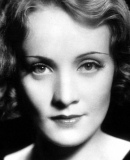
Marlene Dietrich
Marlene Dietrich
Actress
Marie Magdalene "Marlene" Dietrich (27 December 1901 – 6 May 1992) was a German actress and singer who held both German and American citizenship. Throughout her long career, which spanned from the 1910s to the 1980s, she maintained popularity by continually reinventing herself. In 1920s Berlin, Dietrich acted on the stage and in silent films. Her performance as Lola-Lola in The Blue Angel (1930) brought her international fame and a contract with Paramount Pictures. Dietrich starred in Hollywood films such as Morocco (1930), Shanghai Express (1932), and Desire (1936). She successfully traded on her glamorous persona and "exotic" looks, and became one of the highest-paid actresses of the era. Throughout World War II, she was a high-profile entertainer in the United States. Although she still made occasional films after the war, Dietrich spent most of the 1950s to the 1970s touring the world as a marquee live-show performer. Dietrich was noted for her humanitarian efforts during the war, housing German and French exiles, providing financial support and even advocating their US citizenship. For her work on improving morale on the front lines during the war, she received several honors from the United States, France, Belgium, and Israel. In 1999, the American Film Institute named Dietrich the ninth-greatest female star of classic Hollywood cinema. Marlene Dietrich (in gymnastics dress), c. 1910 (Deutsche Kinemathek, Marlene Dietrich Collection, Berlin). Dietrich was born on 27 December 1901 at Leberstraße 65 in the neighborhood of Rote Insel in Schöneberg, now a district of Berlin. Her mother, Wilhelmina Elisabeth Josephine (née Felsing), was from an affluent Berlin family who owned a jewelry and clock-making firm. Her father, Louis Erich Otto Dietrich, was a police lieutenant. Dietrich had one sibling, Elisabeth, who was one year older. Dietrich's father died in 1907. His best friend, Eduard von Losch, an aristocratic first lieutenant in the Grenadiers, courted Wilhelmina and married her in 1916, but he died soon afterwards from injuries sustained during the First World War. Von Losch never officially adopted the Dietrich girls, so Dietrich's surname was never von Losch, as has sometimes been claimed.Dietrich's family nicknamed her "Lena" and "Lene". Around age 11, she combined her first two names to form the name "Marlene". Dietrich attended the Auguste -Viktoria Girls' School from 1907 to 1917 and graduated from the Victoria-Luise-Schule (today Goethe-Gymnasium (Berlin-Wilmersdorf) in 1918. She studied the violin and became interested in theater and poetry as a teenager. A wrist injury curtailed her dreams of becoming a concert violinist, but by 1922 she had her first job, playing violin in a pit orchestra for silent films at a Berlin cinema. She was fired after only four weeks. Her earliest professional stage appearances were as a chorus girl on tour with Guido Thielscher's Girl-Kabarett vaudeville-style entertainments, and in Rudolf Nelson revues in Berlin. In 1922, Dietrich auditioned unsuccessfully for theatrical director and impresario Max Reinhardt's drama academy; however, she soon found herself working in his theatres as a chorus girl and playing small roles in dramas. She did not attract any special attention at first. She made her film debut playing a bit part in the film The Little Napoleon (1923). Marlene Dietrich by Joël-Heinzelmann Atelier, 1918. She met her future husband, Rudolf Sieber, on the set of Tragedy of Love in 1923. Dietrich and Sieber were married in a civil ceremony in Berlin on 17 May 1923. Her only child, daughter Maria Elisabeth Sieber, was born on 13 December 1924. Dietrich continued to work on stage and in film both in Berlin and Vienna throughout the 1920s. On stage, she had roles of varying importance in Frank Wedekind's Pandora's Box, William Shakespeare's The Taming of the Shrew, A Midsummer Night's Dream, as well as George Bernard Shaw's Back to Methuselah and Misalliance. It was in musicals and revues such as Broadway, Es Liegt in der Luft, and Zwei Krawatten, however, that she attracted the most attention. By the late 1920s, Dietrich was also playing sizable parts on screen, including roles in Café Elektric (1927), I Kiss Your Hand, Madame (1928), and The Ship of Lost Souls (1929).
For more information press the link below:
